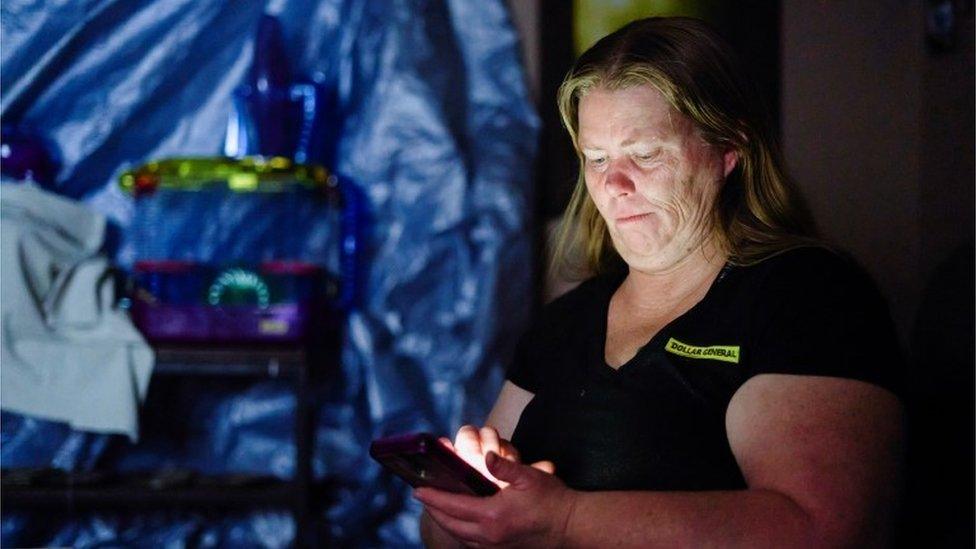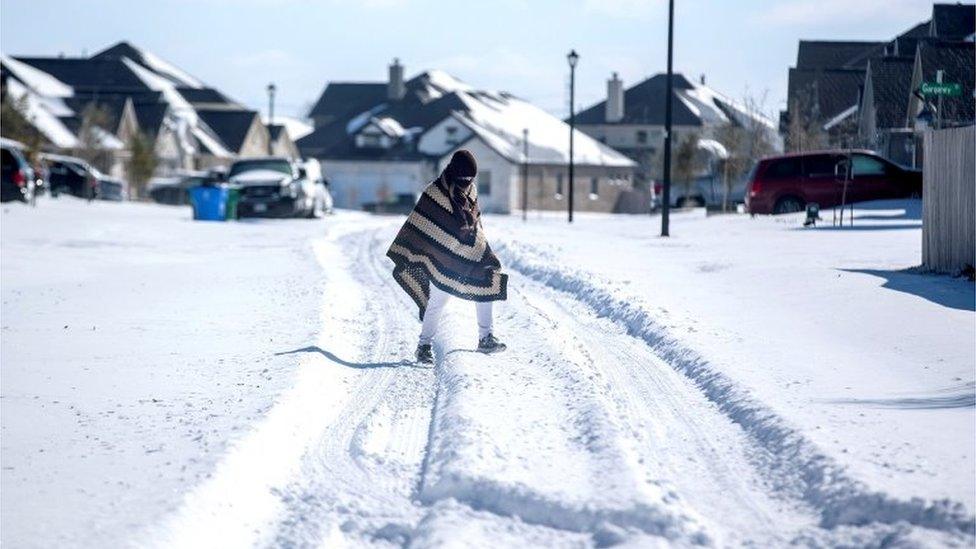Texas weather: State should pay soaring power bills, says Houston mayor
- Published
A 92-year-old man in Texas struggles to stay warm
The mayor of Houston has called for the state of Texas to pay the huge electricity bills racked up by residents due to the freezing weather.
Sylvester Turner told CBS News it was not the fault of residents that the system could not cope.
Some residents reported bills of up to $16,000 (£11,500) for just a few days of usage, as temperatures hit 30-year lows of 0F (-18C) last week.
At least 70 people died as the freeze swept several southern US states.
Texas has since seen a return of its usual milder winter weather, with temperatures as high as 64F.
However, residents are still having to boil water due to fears of contamination caused by low water pressure and ruptures at water mains.
What bills are people facing?
The deadly storm, which blanketed Texas in snow last week, knocked out power to millions of people across the region.
But some residents who were still able to turn on their lights and keep their fridges running found themselves with bills reaching thousands of dollars.
Dallas resident and US Army veteran Scott Willoughby told the New York Times, external that he faced a $16,000 bill which had obliterated his savings.
Susan Hosford, who lives in the city of Denison, told the Associated Press she had been charged $1,346 for the first two weeks of February alone and faced bank charges when the money automatically left her account, despite not having enough funds.
Many people who have gone public on social media about their high electricity bills are customers of electricity provider Griddy, which only serves Texas.

Why are they so high?
Texas is one of the few US states to have an independent energy grid - so when the cold snap hit and power was in short supply, they were unable to receive support from neighbouring states.
As a result, the Public Utility Commission of Texas decided at an emergency meeting last Monday, external to raise the price of energy.
This change has not affected people on fixed-rate payment plans for their power. However, people on variable-rate tariffs - which can work out cheaper in the short-term, when weather conditions are consistent - have been hit hard by the increase and are now facing soaring costs.

Christina Beverly, whose home in Fort Worth is still blacked out
Griddy offers one of the most popular wholesale plans in the state. The company warned its customers of rising prices due to the storm, external and told them to switch to a different electricity provider - however there was not enough time for most people.
Electricity supplies have largely been restored in Texas, but just over 15,000 customers were still without power by Monday lunchtime, according to Poweroutage.us, external.
The Electric Reliability Council of Texas, which oversees the power system for most of the state, is being accused of not being prepared for the shortages.
Who should pay?
Mayor Turner told CBS, external that when he was in the state legislature, he had filed a bill to ensure there was "adequate reserve" to prevent blackouts, but it was not considered by the state's leaders.
The mayor of the country's fourth largest city suggested the system was not up to the challenges of storms produced by climate change.
"All of this was foreseeable. I wrote about it in 2011. And so for these exorbitant costs, it's not the consumers who should assume those costs.

Texas was blanketed in snow last week
"They are not at fault for what happened this week."
Fort Worth Mayor Betsy Price also told CBS that help with bills should come from Texas and the federal government.
Texas Governor Greg Abbott has called for action to ensure Texans "do not get stuck with skyrocketing energy bills".
"We have a responsibility to protect Texans from spikes in their energy bills that are a result of the severe winter weather and power outages," he said after meeting lawmakers.
President Joe Biden declared a major disaster in Texas on Saturday, clearing the way for more federal funds to be spent on relief efforts.
Why was Texas so cold?
According to the US National Weather Service (NWS), this was down to an "Arctic outbreak" that originated just above the US-Canada border, bringing a winter snow storm as well as plummeting temperatures.
Cold air outbreaks such as these are normally kept in the Arctic by a series of low-pressure systems, the NWS said.
However, this one moved through Canada and spilled out into the US, reaching many southern areas.